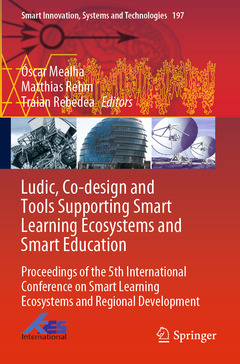Ludic, Co-design and Tools Supporting Smart Learning Ecosystems and Smart Education, 1st ed. 2021 Proceedings of the 5th International Conference on Smart Learning Ecosystems and Regional Development Smart Innovation, Systems and Technologies Series, Vol. 197
Coordonnateurs : Mealha Óscar, Rehm Matthias, Rebedea Traian

This book presents papers from the 5th International Conference on Smart Learning Ecosystems and Regional Development, which promotes discussions on R&D work, policies, case studies, entrepreneur experiences, with a particular focus on understanding the relevance of smart learning ecosystems for regional development and social innovation, and how the effectiveness of the relation of citizens and smart ecosystems can be boosted. The book explores how technology-mediated instruments can foster citizens? engagement with learning ecosystems and territories, providing insights into innovative human-centric design and development models/techniques, education/training practices, informal social learning, innovative citizen-driven policies, and technology-mediated experiences and their impact. As such, it will inspire the social innovation sectors and ICT, as well as economic development and deployment strategies and new policies for smarter proactive citizens.
Chapter 1.Classroom lighting and its effect on student learning and performance: Towards smarter conditions.- Chapter 2. Alive in Smart Countryside.- Chapter 3. Newcomer Integration in Online Communities: Chronemics in Asynchronous Collaborative Discussions.- Chapter 4. An analysis of alternation schemes to increase student employability and the smartness of secondary schools.- Chapter 5. What Makes New Technology Sustainable in the Classroom: Two Innovation Models Considered.- Chapter 6. Conceptualization of hypersituation as result of IoT in Education.- Chapter 7. A territorial learning ecosystem for parents’ participation and cooperation.- Chapter 8. A territorial learning ecosystem for parents’ participation and cooperation.- Chapter 9. Escape from Dungeon – Modelling User Intentions with Natural Language Processing Techniques.- Chapter 10. Effect induced by the Covid-19 pandemic on students’ perception about technologies and distance learning.
Presents papers from the 5th International Conference on Smart Learning Ecosystems and Regional Development
Provides an overview of major research applications in smart learning ecosystems
Is a valuable resource for practitioners, researchers and students alike
Date de parution : 09-2021
Ouvrage de 270 p.
15.5x23.5 cm
Disponible chez l'éditeur (délai d'approvisionnement : 15 jours).
Prix indicatif 158,24 €
Ajouter au panierDate de parution : 09-2020
Ouvrage de 270 p.
15.5x23.5 cm
Disponible chez l'éditeur (délai d'approvisionnement : 15 jours).
Prix indicatif 158,24 €
Ajouter au panier